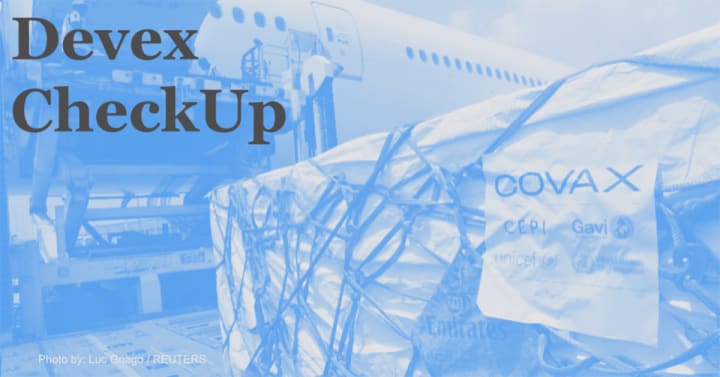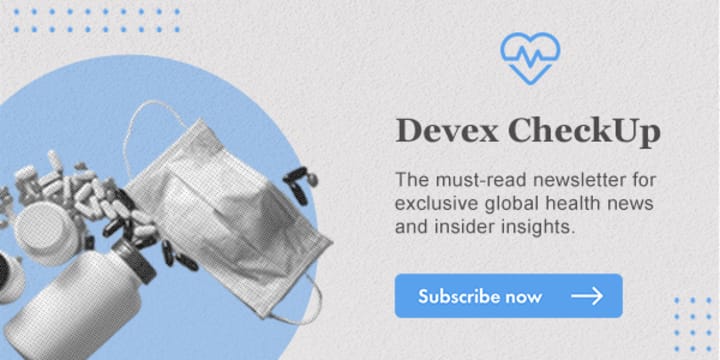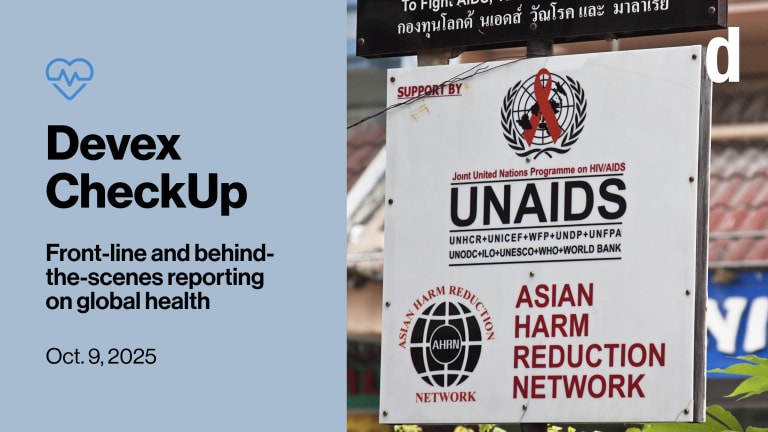
On Wednesday, Merck announced that molnupiravir — its new antiviral pill against COVID-19 — would see broader global access through a voluntary licensing agreement with the Medicines Patent Pool. The company says its pill halved the risk of hospitalization or death among at-risk, nonhospitalized mild to moderate COVID-19 patients in a large clinical trial. With a royalty-free deal during the pandemic, advocates hope that lower-income countries can manufacture the pill domestically to help control COVID-19 infections.
This is a preview of Devex CheckUp
Sign up to this newsletter for exclusive global health news and insider insights, in your inbox every Thursday.
Yet the agreement has a catch: While it covers 105 nations, some middle-income countries have been left out. With additional concerns over safety and logistics, it’s not clear that the new drug will change the conversation for many around the world who have struggled to access vaccines and other treatments.
• Merck expects to produce 10 million treatment courses of molnupiravir in 2021 and an additional 20 million in 2022. The U.S. government has already closed a deal for 1.7 million courses of the drug, pending regulatory approval. Other countries have also reportedly made deals or begun negotiations with the company.
• Advocates for equal access to medicines are worried about middle-income countries that have been excluded from this week’s agreement — including Brazil, Argentina, and Peru — despite their high per capita COVID-19 death tolls.
• Last week, the Bill & Melinda Gates Foundation announced up to $120 million in funding to support generic production of the drug and access for lower-income countries. But advocates have pressed the foundation to take even bolder action — specifically, pushing for intellectual property waivers at the World Trade Organization and demanding that Merck sign voluntary licenses covering all countries.
• Meanwhile, some experts have raised questions over the drug’s safety. “They all keep saying it is safe, but not much has been published (and peer reviewed) yet by researchers that don't have a conflict of interest. I'd like to see results from independent researchers,” Katherine Seley-Radtke, president-elect of the International Society for Antiviral Research, tells Jenny.
Read: Merck expands manufacturing for molnupiravir. But questions remain
Dispatch from Berlin
The annual World Health Summit in Berlin is growing in influence. Germany's Health Ministry sponsored an entire track at this year's event, signaling that WHS is at the forefront of the country’s efforts to cement Berlin's status as a global health hub, while WHO has signed on to jointly sponsor next year's gathering.
But at an event where more than 370 speakers wrestled with how to advance global health policy, civil society was largely absent, Andrew Green reports for Devex.
The result was conversations that ignored many of the global south's most pressing demands to address public health crises, including the COVID-19 pandemic. But health advocates are not hoping for a free pass. “We're very interested to open it up for a controversial debate," says Mareike Haase, the international health policy adviser for Bread for the World. "That's what we need and that's what we're missing here."
Devex Pro: The case of the missing civil society at the World Health Summit
+ Devex Pro subscribers can learn more about how “One Health” gets a revamp at WHS. Not yet a Pro subscriber? Sign up now and start your 15-day free trial.
Long shot
At the start of the COVID-19 vaccine rollout in Africa, WHO urged countries to focus on vaccinating as many people as possible rather than reserving half of their shipments for second doses. Nigeria was one of the nations that opted to prioritize full vaccination — but, as Paul Adepoju reports from Abuja, this has created logistical bottlenecks and left many scrambling for a single dose.
Amid severe vaccine shortages on the continent, Moderna committed on Tuesday to providing the African Union with up to 110 million COVID-19 vaccine doses, under an agreement partially brokered by the U.S. “In almost all instances, without exception, we were told there would be no vaccines available for us to purchase in 2021,” said Strive Masiyiwa, special envoy on COVID-19 for the African Union, calling the new deal a “breakthrough.”
A familiar problem
“We know what to do [for health emergency preparedness and response]. We just cannot seem to do it.”
— A report by the Global Preparedness Monitoring BoardThe GPMB released a long list of recommendations this week on how the world’s governments and multilateral organizations can prepare for the next global health emergency. Whether they’ll follow them remains to be seen.
Read more: High-level body urges countries to forge a pandemic agreement
One big number
5 million
—That’s the total number of COVID-19 deaths that the world is expected to officially reach within a week. WHO has said that this is likely an undercount, and the agency is set to release excess mortality estimates soon.
What we’re reading
A new study shows an antidepressant drug can cut COVID-19 patients’ risk of hospitalization and death. [Science News]
A Malaysian doctor has developed what he calls the world’s first unisex condom. [Reuters]
Novavax files for U.K. authorization of its COVID-19 vaccine. [Bloomberg]






